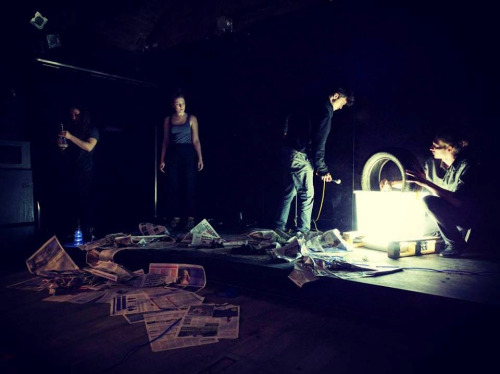It started early on a cold and foggy Thursday. The fifth of November 2015, the morning of Bonfire Night. We met on the Botanics’ footbridge crossing the Kelvin. Eerie music, the reading of a short text, biscuits, coffee and juice: the liminoid meets the familiar, comfort mixed with Unheimlichkeit. Already this first meeting, with a loose agenda, a small breakfast and a non-binding ritual was hard to place. The Doing Group, as the first manifest that morning postulated ‘rejects simple answers’.
It started as an alternative to a reading group. In the proximity of theatre and performance, people are well aware that there are more ways into a topic than books. Making sense is an inherently active process. Doing is a way of understanding. The Doing Group sets out to explore proactively.
It started, because we wanted to do something. ‘Every doing in turn creates new realities’. It is a meaning-making process not only through understanding, but through the creation of the world around us. The Doing Group shapes its surroundings as it tries to explain it.
It started as a performance research collective, employing a plethora of different strategies reaching from invisible theatre and urban exploration to staged performances. We’re 6 members, located between Glasgow and Helsinki. We’re interested in many things. Urbanism, ecology, supermodernity, new materialism, concrete, liveness, ruins, labour and other topics along the way. During our first few months, our practice was simply to meet up regularly. We had investigative sessions outside and reflective sessions in the studio. Exploration and development. We gave ourselves a rule to work by: no answers, just questions. We would try and set ourselves a question that hopefully turned out impossible to answer and only move on to a new question, once we had failed to answer the old one exhaustively and to all of our satisfaction. So far, we have successfully failed to answer anything, often just raising more and more questions along the way. This process has helped us to figure out what we find truly interesting, and also to some extent made us undo existing knowledge and approach things with genuine curiosity and a confident lack of expertise.
At some point during these first few months of exploration, we felt that we had discovered enough questions that we could try and present something performatively to other people. We did not try to make shows that answered things, but that perhaps recreated some of our approaches, experiences, failures and questions. ‘Rain Is Liquid Sunshine’ was scratched at Only Skin first, and developed from there into a full-length performance shown at the Southside Fringe and UNFIX ReBirth. It investigates urban ecological cycles, and with it cycles of labour, production, ruination and location. It poses the question what futures we can imagine, when the idea of progress is drained away.

Since then, we have developed one other full-length performance, with the help of the University of Glasgow’s Alasdair Cameron Scholarship. ‘Elsewheres’ is a simultaneous performance between Glasgow and Helsinki, engaging with ideas about choice, overabundance, commodification of time and desire. It was shown in Glasgow and Helsinki simultaneously on the 10th and the 11th of March.
During our first year as a collective, we organised a series of seminars, where we would invite a speaker to present on a topic of their choice and in return serve them dinner. The talk would then be discussed over shellfish. This series of events, obviously called ‘Lobster Lectures’, was a way for us to engage deeper with our department and understand the interests and research of our teachers beyond the limits of the classroom. This has since also come to shape our practice through a sense of creative permeability: We try to let skills, interests and ideas enter our process, no matter whether they are obviously related or not; no matter if they’re ours or from somewhere else.
The idea of permeability goes hand in hand with that of creative absence: While we’re all dedicated, we’re not always in the same space, and we’re not always equally available. But navigating these issues, we actually gained a lot of trust into each other and us as a group. For example, it’s just me (Josh) in front of my laptop right now. Yet I know that everyone will be happy for me to write and sign and send this text and it will be representative of the whole group. Our members are the party line. Through this, we have found out much about creative absence and using the gaps that appear when not everyone is always equally present. In fact, these gaps often inspire the greatest creative leaps.
Seeking failure, permeability and creative absence are processes that don’t dictate a specific method or product. They aren’t themselves a tool for devising as much as a way to hold the tools. I think, perhaps, that these approaches are to practice what weak theory is to discourse: they don’t claim completeness or priority. They don’t compete with other approaches as much as enrich them. Rather than to restrict yourself through adhering to a grand approach or all-encompassing practice, these instances of what I call weak practice will hopefully lend themselves to all kinds of situations, enhancing other methods. Whatever topic we would engage with, whatever strategy we’d employ, these weak practices helped us in our creative processes, our group dynamics and our understanding of ideas.
And hopefully, they carry across in our performances as well. Keith Bruce wrote about The Doing Group to ‘give them your active support,’ so take it from him and check out our projects in the future.

